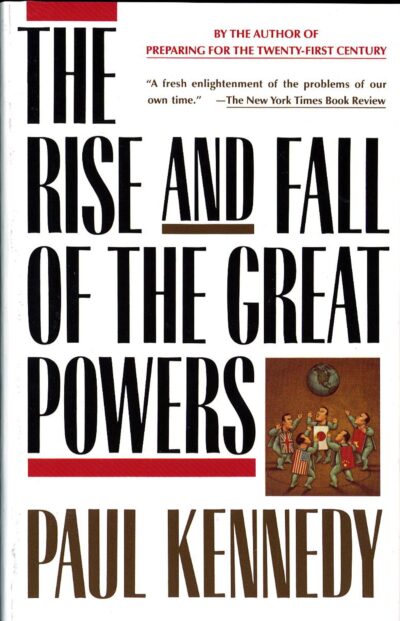
This was a book recommended by Ray Dalio, who said it was influential for him as he thought about how economic policy and decisions have created the current world order. So, given the impact it had on Ray Dalio, I picked this book up.
I enjoyed the historical depth here. It’s quite a feat to review the last 500 years and analyze the international, economic, and political waves, and determine how balances and wars have shaped and formed the current world system.
I admire Kennedy’s attention to detail and analysis of so much data, both on the economic side and the military side. He goes to great lengths to unpack the economic picture of each of the great powers.
My biggest takeaway was seeing how impactful economic policy and decisions have been in forming the balance of power we see today.
A few other takeaways or interesting things I learned were:
- How the invention of nuclear weapons has likely served to ensure that all future wars will be merely conventional (not nuclear)
- The health of the national economy for a nation has, in each case, determined militaristic victory in prolonged conflicts
- When a country has overextended itself geographically and strategically it begins to devote too much capital to protection and not enough toward productive investment
- Over time, this misdirection of capital leads to economic decline and the inability of the country to support its global over-extension
- A primary dilemma that country leaders face: do they 1) purchase or produce military security to the detriment of their national economy or 2) focus on their national economic health but eventually become threatened by other countries militarily? (only precious few examples exist of a country maintaining balance between these two scenarios for very long)
Overall, I enjoyed the attention to detail, but occasionally found myself getting bogged down in the minutiae. One thing I didn’t like was that Kennedy often strings sentences together into long paragraphs by overusing the semicolon.
Scripturally, I was reminded several times of Acts 17:24-27. Paul is speaking to the Greeks at the Areopagus and he says:
24 The God who made the world and everything in it, being Lord of heaven and earth, does not live in temples made by man, 25 nor is he served by human hands, as though he needed anything, since he himself gives to all mankind life and breath and everything. 26 And he made from one man every nation of mankind to live on all the face of the earth, having determined allotted periods and the boundaries of their dwelling place, 27 that they should seek God, and perhaps feel their way toward him and find him.
Acts 17:24-27
God has ordained the boundaries of the dwelling places of all men, from the beginning of time up to the present day. God has been in control of where each country and their people have lived, died, and made decisions on a global scale. God is in control of each nation’s particular geography, natural resources, and the global accessibility of their population. In light of this, I believe that God has sovereignly influenced the current world order.
Kennedy’s book is available here:


Really enjoyed this
I’m glad you liked it, and thanks for reading! 🙂